FFSG has global mission
Considering that freshwater habitats contain just 0.3 % of global water resources they are home to a surprising diversity of species with around 15,000 described to date, a figure which represents almost half of all known fish taxa and approximately 25 % of all vertebrates.
Freshwater fishes are displayed in zoos and public aquaria across the planet, maintained at home by countless private hobbyists, fished for by recreational anglers, portrayed extensively in art and culture, and heavily exploited for human or domestic animal feed and other products (Reid et al., 2013).
Unfortunately, however, not all is well…
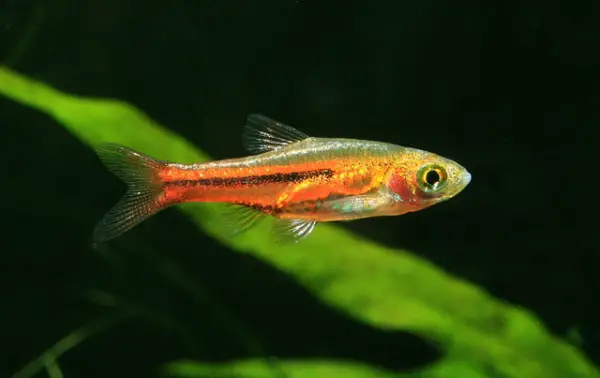
Trigonostigma somphongsi is a relative of the popular harlequin, T. heteromorpha, but is almost extinct in its native Thailand. © Nonn Panitvong
Recent IUCN reports suggest that they may be the most threatened vertebrate group on the planet due to a combination of factors including habitat modification, fragmentation, and destruction in the form of: introduction of non-native, invasive species; overfishing; environmental pollution; forestry management; and climate change, with as many as 20 % set to go extinct in the next 30 years.
For instance, dam construction has exploded since the 1960s and 3 to 6 times more water is now held in artificial reservoirs than natural rivers, while water extraction has doubled over the same period with 70 % used for agriculture.
The damage caused by introduction of invasive species such as nile perch, tilapia, and mosquitofish, is well-documented, while unsustainable overfishing of rivers and lakes has led to huge declines, especially in high-value food fish such as European eel, salmon, sturgeon, etc., but also countless lesser-known species.

Wide-scale replacement of highly diverse peat swamp forest with oil palm plantations in Southeast Asia is having a devastating effect on aquatic ecosystems. Image taken in Selangor, Malaysia, August 2013. © Matt Ford
Environmental pollution is having catastrophic effects and in some countries the widespread presence of man-made chemicals such as antidepressants or birth control pills is now considered as damaging as unsustainable industrial and agricultural activities.
Forestry practice can also have an adverse effect on freshwater biodiversity with major atrocities including the continued burning of ancient peat swamp forest in southeast Asia, while climate change will also bring about extinctions as water temperatures rise.
Despite all this, there is only a limited political and public awareness of the major global challenges that directly or indirectly threaten the survival of freshwater fishes in the wild (Reid et al., 2013).
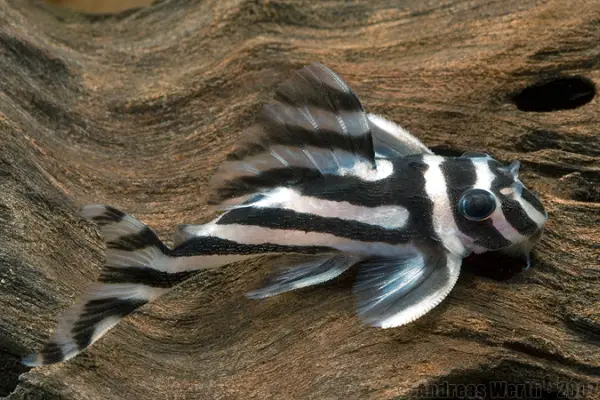
Hypancistrus zebra is an iconic species under threat due to construction of the Belo Monte dam on the rio Xingu in Pará state, Brazil. © Andreas Werth
The FFSG mission is very simply to have all freshwater fishes valued in their own right and sustained in their natural environment via a broad-based approach, and it is the only freshwater fish group with a global remit and agenda.
They aim to achieve conservation and sustainable use of freshwater fishes and their habitats through generation and dissemination of sound scientific knowledge, creation of widespread awareness of their values, and by influencing decision-making processes at all levels.
The group was established in 2004 and their inaugural meeting was held in 2005 in Chester, UK with the global chair having been held by Professor Gordon McGregor Reid of Chester Zoo since 2004, and during this period the FFSG has grown from a vague concept into a dynamic and successful international working group.
As of December 2013 the chair will be taken up by Dr. Richard Sneider, CEO of One World Apparel LLC and Unger Fabrik LLC, member of the Chairman’s Council of Conservation International and board member at Los Angeles Zoo and the Humpty Dumpty Institute.
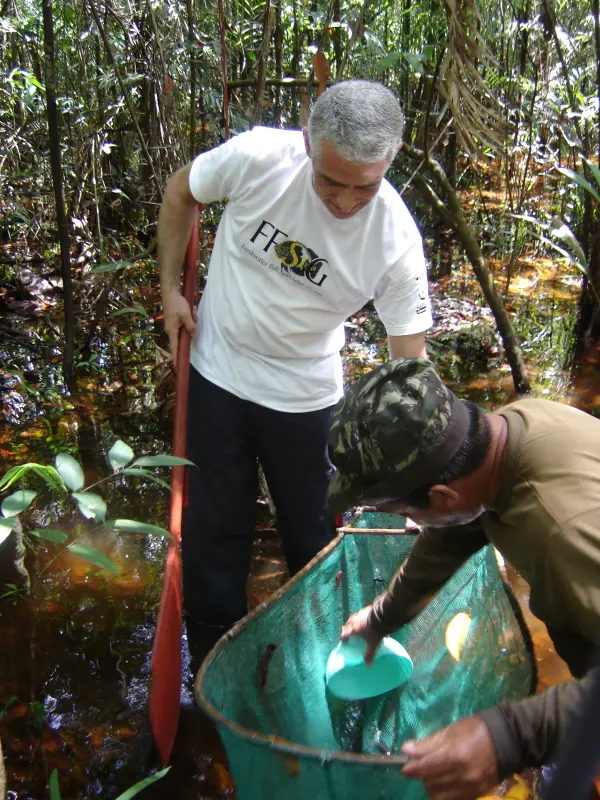
FFSG t-shirt worn by Dr Roberto Reis, FFSG Regional Chair for South America, in Barcelos, Amazonas state, Brazil. © Padro Podesta Aquino
It now covers 17 global regions, each with a Regional Chair or two Co-Chairs, and has a total membership comprising around 200 of the world’s finest experts.
In addition to facilitating this global network the FFSG also works as the Red List Authority for the IUCN with the ultimate aim of accurately categorising all 15,000 freshwater fish species.
They also make it clear that zoo and aquarium education and marketing departments have a significant role to play in terms of communicating issues, raising awareness, changing behaviours and gaining widespread public and political support for conservation actions.
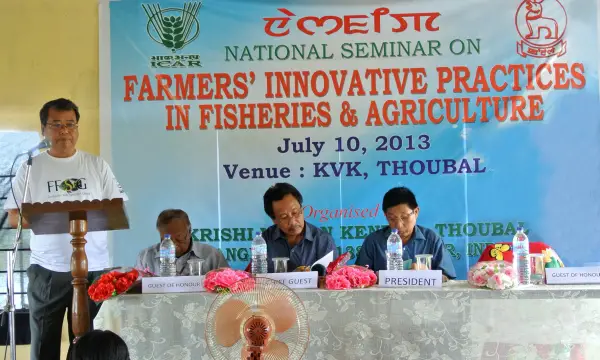
Professor Waikhom Vishwanath. FFSG Regional Co-Chair for South Asia, wears a FFSG t-shirt at a seminar held at the Krishi Vighyan Kendra (Agricultural Science Centre), Thoubal District, Manipur, India, in which fish farmers from different parts of the state and resource persons from different institutes were present. The farmers were invited to present innovative techniques of fish culture and prizes were distributed. © FFSG
Approximately 450 million people visit > 315 large-scale public aquariums each year and in the United Kingdom alone some 3.9 million hobbyists keep fishes (Reid et al., 2013) and this represents a huge potential audience.
Since SF was set up with such a message in mind we’re particularly happy to do our bit going forward. The FFSG is to launch an international citizen science project named ‘Bioblitz‘ in February 2014 and we’ll be bringing you up-to-date news about this as well as other topics related to their work.
In the meantime check out the new FFSG website where you’ll find a lot more information plus details of how to become a member if you’re an ichthyologist or work in fish conservation. We also recommend signing up to the group’s newsletter which is free to all.
References
FFSG website: http://www.iucnffsg.org/
Reid, G. M., T. Contreras Macbeath, and K. Csatádi. 2013. Global challenges in freshwater-fish conservation related to public aquariums and the aquarium industry. International Zoo Yearbook 47(1): 6-45
…
Read more articles in the SF conservation series.
Category: Articles, Conservation | Tags: aquarium, conservation, FFSG, fish, freshwater, Freshwater Fish Specialist Group, IUCN | Comment »

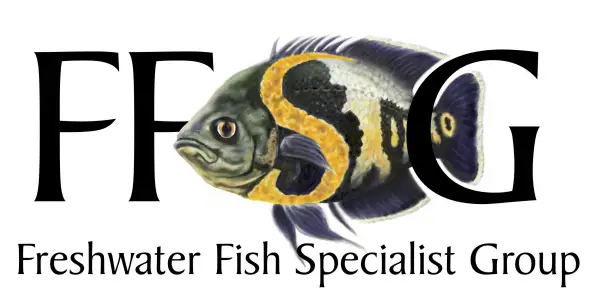

Site improvements
thanks
21st Jan 2025
Site improvements
This is an excellent post, glad you shared it. I just stumbled upon your blog and have enjoyed reading your posts.
14th Jan 2025
Site improvements
This is an excellent post, glad you shared it.
14th Jan 2025
Product reviewers wanted
Are you still looking for product reviewers?
19th Dec 2024
Product reviewers wanted
Hey! Interesting article!
17th Dec 2024